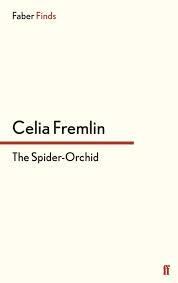
"Darling, we're together at last!". cried Rita, shaking the rain from her hair and spilling a suitcase, a bulging plastic carrier bag, and a clanking tangle of metal coat-hangers into the circle of lamplight at his feet. "Together! In our very own home!"
My very own home, Adrian found himself thinking uncontrollably, even while he folded her into his arms, murmuring into her ear all the appropriate words of welcome. My flat. Mine. And now the woman I love is moving into it, bag and baggage, and there is nothing in the wide world I can do to stop it, because it was my idea.
I discovered Celia Fremlin's novels at the beginning of this year, thanks to Faber Finds, who are offering print on demand copies of all nineteen of her excellent novels. I reviewed some of them in issue 1 of Shiny New Books, and Victoria wrote a fascinating biography of Fremlin in the same issue. But Faber kindly sent me more books than I was able to include there, so I'll be reviewing the others here from time to time.
This one, The Spider Orchid, was published in 1977. Like all Fremlin's novels, it is witty, perceptive and chilling, all at once. This is the story of Adrian, who finds himself in a terrible quandary, as the quotation at the top here demonstrates. He's been having a lovely love affair with the beautiful Rita, begging her for years to leave her husband and come to live with him, and now she has, he realises that his delightful single life will have to change radically. No more long soaks in the bath, no more reading books with all his meals. And is that weren't enough, what will happen to his precious Sundays with his beloved teenage daughter Amelia, who likes nothing more than lying at his feet reading while he works at his desk? Perhaps Rita will understand, he thinks. But Rita does not.
Rita, beautiful and elegant, is, in fact, a monster. When she doesn't get her way, she weeps copiously, or flies into furious rages. Once Adrian, having summoned the best grace possible, has welcomed her into his flat, he starts to hear the most alarming stories about her from her husband, who appears to be far from the bullying bigot she has painted him as. And as for poor Amelia, Rita tries her best to alienate her from her father, while simultaneously pretending to be the ideal stepmother. She finally manages to steal Amelia's secret diary and tries to use it to discredit the girl at school, hoping she will be expelled, and end up being sent to a home for disturbed children. Things go from bad to worse, and Amelia ends up in a terrifying situation... More I cannot say.
Anyway, this is a superb novel. The characters are beautifully observed and the situations only too recognisable and believable. There's comedy here at times, but with a serious and increasingly gothic twist, and Fremlin deals with great sensitivity with relationships between parents and children, divorced couples, and human beings in general. I've said it before, and you'll certainly hear me say it again -- Fremlin is a wonderful writer and hooray for Faber for rediscovering her.
